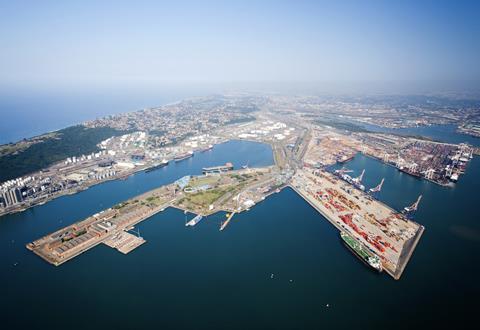South African fresh produce exporters face another season of trouble and discontent as World Bank report lists most of the country’s ports at the bottom of global container handling facility index
Problems at South Africa’s ports and a declining rail service are an annual problem for the country’s exporters, and it seems that these problems will continue in the coming season.

That is according to the recently released World Bank report, ’Container Port Performance Index 2020: A Comparable Assessment of Container Port Performance (CPPI)’.
The anger in the export sector has increased further since it was announced that Transnet, which controls the rail and port authorities, has suffered major losses in the past year.
It also appears that the South African government has finally lost patience with senior executives at the company.
Damning rankings
The report was based on two different methodological approaches. In terms of administrative approach, which considered knowledge of exports, the Durban container terminal, at 351, ranked in the bottom three of the world’s competent container handling facilities.
The port of Ngqura near Port Elizabeth (349), the Port of Port Elizabeth (348) and the Port of Cape Town (347) did not fare much better.
So, what can the South African fruit export sector do when, year-after-year, they are confronted with these problems? Nothing different than in the past, it seems.
There are lots of meetings and discussions, and mostly promises of improved performance which, as the season progresses, never seem to come true.
In the off-season the fruit sector, including the Exporters’ Association, Hortgro, SATI, the CGA, Berries ZA and the Western Cape government, which is a staunch supporter of the fresh produce export sector, met again with the port authorities to try and effect better performance in Cape Town.
After that, in its newsletter, Hortgro stated that as an industry body, it had limited operational control over the plans made during the winter.
“But will continue to push, motivate, lobby, and monitor as hard as we can for the promised interventions to come to fruition,” it said. ”Logistics is the single biggest current threat to the industry’s sustainability.”
It also appears the industry will take some steps on its own to try and promote better port performance.
“In addition to this, Hortgro is also part of the collective fruit industry grouping trying to convince a major additional shipping line to service South African ports to create additional capacity and competition,” it said.
“Growers, exporters, and their logistical service providers have been, and are actively encouraged to collectively discuss short term solutions, such as moving export volumes out of the peak weeks (1-10) from the Cape Town Container Terminal to alternative shipping options or modes.
“The wind will blow during January and February,” Hortgro continued. “This will result in shipping delays. And, with the good winter behind us, we are expecting increases in all fruit exports.”
Alternative options
The industry body said that alternative options included the use of Eastern Cape ports, Walvis Bay, smaller container vessels at the Multi-Purpose Terminal (in Cape Town), Specialised Bulk Reefer Vessels and optimal 24-hour use of the port.
“Each of these options has an additional cost implication, but the risk of arriving late at the market and having quality issues, far outweighs these additional costs,” Hortgro noted. ”These remain commercial decisions that are in the ambit of producers, exporters, and other service providers.”
Stonefruit growers are also urged to manage volumes through the reduction of smaller sized fruit, following a good winter and with adequate irrigation water available to promote good crops.
Hortgro concluded that there was ‘no quick fix solutions or a silver bullet’. “We will collectively have to deploy several actions over the short term,” it said.
The CGA is hoping that the involvement of an equity partner at Durban’s Container Terminal will result in some much-needed change.
It is after all South Africa’s biggest export port, and problems in Durban have bugged the fruit sector for many years.



